Rates of central bank securities end lower with both tenors oversubscribed

YIELDS on the central bank’s short-term securities ended lower on Friday, with strong demand seen for both tenors.
The Bangko Sentral ng Pilipinas (BSP) bills fetched bids amounting to P149.916 billion on Friday, higher than the P80-billion offer and the P124.432 billion in tenders for the P120 billion auctioned off a week prior. The central bank awarded P80 billion in securities as planned.
Broken down, tenders for the 28-day BSP bills reached P69.713 billion, well above the P30 billion placed on the auction block and the P40.817 billion in bids for the P40-billion volume offered in the previous week. The central bank fully awarded the one-month papers.
Banks asked for rates ranging from 5.625% to 5.738%, lower than the 5.65% to 5.849% margin seen a week earlier. This caused the average rate of the one-month securities to decline by 6.55 basis points (bps) to 5.7135% from 5.779% previously.
Meanwhile, bids for the 56-day bills amounted to P80.203 billion, higher than the P50-billion offering but below the P83.615 billion in tenders for the P80-billion offer by the central bank a week prior. The BSP also made a full award of the two-month bills.
Accepted yields were from 5.649% to 5.74%, lower than the 5.65% to 5.8% band seen a week prior. With this, the average rate of the 56-day securities dropped by 4.13 bps to 5.7135% from 5.7548% logged in the previous auction.
The central bank decreased last week’s total offering of BSP bills (BSPB) compared with the volume put up for auction the prior week and fully awarded both tenors amid strong demand, BSP Deputy Governor Francisco G. Dakila, Jr. said in a statement.
“The 28-day BSPB was 2.3 times oversubscribed and the 56-day BSPB was 1.6 times oversubscribed,” he said.
“The decline in BSPB rates continued to reflect the partial pass-through of the 25-bp reduction in the policy rate on April 11,” Mr. Dakila added.
The Monetary Board this month resumed its rate-cutting cycle, delivering a 25-bp cut to bring the policy rate to 5.5%.
The central bank uses the BSP securities and its term deposit facility to mop up excess liquidity in the financial system and to better guide short-term market rates towards its policy rate.
The BSP bills also contribute to improved price discovery for debt instruments while supporting monetary policy transmission, the central bank said.
The central bank securities were calibrated to not overlap with the Treasury bill and term deposit tenors also being offered weekly.
Data from the central bank showed that around 50% of its market operations are done through the short-term BSP bills.
The BSP bills are considered high-quality liquid assets for the computation of banks’ liquidity coverage ratio, net stable funding ratio, and minimum liquidity ratio.
They can also be traded on the secondary market. — Luisa Maria Jacinta C. Jocson




